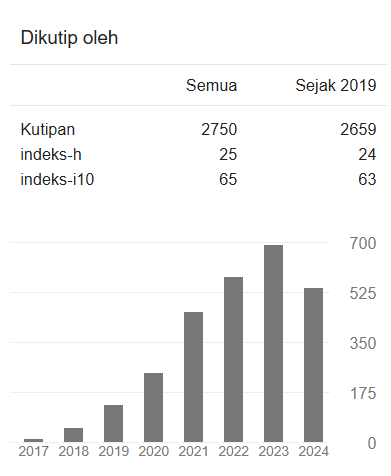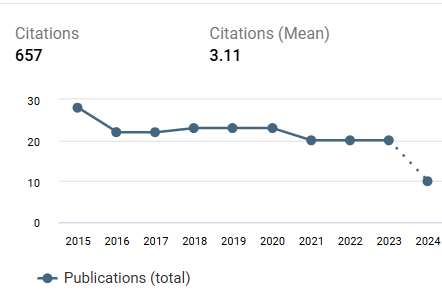Pengembangan gim kuis edukasi suplemen buku ajar pengantar dasar IPA berbasis website
DOI:
https://doi.org/10.22219/jinop.v7i2.18576Keywords:
Quiz Game, Websites, Textbooks, Basic Introduction to ScienceAbstract
Technological developments in the digital era demands innovation in learning. Learning innovation is developed according to the needs and demands of solving problems in the field. This study aimed to develop a supplementary basic introductory science textbook in the form of a website-based quiz game that can be accessed using a smartphone. The textbook supplement quiz game was created with the aim of maximizing the use of smartphones owned by students and reducing the negative impacts of using smartphones in learning. The method in this study was Research and Development (R&D) method using a procedural model. The data collection instruments in this study were validation sheets, student response questionnaire sheets, and test questions. The test subjects in this study were 73 students of the elementary school teacher education program at the Muhammadiyah University of Kotabumi. The results of the quiz game feasibility test were 79.42% and were declared eligible because they were greater than 61%. The level of effectiveness of the quiz game is 90.47% and is declared effective because it is greater than 80%. Practical test of the practicality of using quiz games by 87.06% was declared practical because it was greater than 61%. The use of quiz games supplementing the basic introductory science textbooks can improve student learning outcomes and be able to reduce the negative impact of smartphone use and maximize the benefits of using smartphones in learning.
Downloads
References
Abildinovaa, G. M., Alzhanova, A. K., Ospanovab, N. N., Taybaldievac, Z., Baigojanovaa, D. S., & Pashovkina, N. O. (2016). Developing a mobile application “educational process remote management system” on the android operating system. International Journal of Environmental and Science Education, 11(12), 5128–5145. http://www.ijese.net/makale/692.html
Al-Qaysi, N., Mohamad-Nordin, N., & Al-Emran, M. (2020). Employing the technology acceptance model in social media: A systematic review. In Education and Information Technologies (Vol. 25, Issue 6). Education and Information Technologies. https://doi.org/10.1007/s10639-020-10197-1
Alfiras, M., & Bojiah, J. (2020). Printed Textbooks Versus Electronic Textbooks: A Study on the Preference of Students of Gulf University in Kingdom of Bahrain. International Journal of Emerging Technologies in Learning, 15(18), 40–52. https://doi.org/10.3991/ijet.v15i18.15217
Awwaabiin, S. (2020). Pengertian PHP, Fungsi dan Sintaks Dasarnya. Niagahoster Blog. https://www.niagahoster.co.id/blog/pengertian-php/#:~:text=PHP (PHP%3A Hypertext Preprocessor),berbeda tergantung data yang diproses.
Bierman, P., Massey, C., & Manduca, C. (2006). Reconsidering the textbook. Eos Science News by AGU, 87(31), 306. https://doi.org/10.1029/2006eo310004
Broussard, M. J. S. (2014). Using games to make formative assessment fun in the academic library. Journal of Academic Librarianship, 40(1), 35–42. https://doi.org/10.1016/j.acalib.2012.12.001
Csibi, S., Griffiths, M. D., Demetrovics, Z., & Szabo, A. (2019). Analysis of Problematic Smartphone Use Across Different Age Groups within the ‘Components Model of Addiction.’ International Journal of Mental Health and Addiction, 616–631. https://doi.org/10.1007/s11469-019-00095-0
Gorbanev, I., Agudelo-Londoño, S., González, R. A., Cortes, A., Pomares, A., Delgadillo, V., Yepes, F. J., & Muñoz, Ó. (2018). A systematic review of serious games in medical education: quality of evidence and pedagogical strategy. Medical Education Online, 23(1). https://doi.org/10.1080/10872981.2018.1438718
Hermawan, D., Haryanto, I. P. B., & Yogis, I. G. D. M. (2019). Pemanfaatan Smartphone sebagai Media Informasi untuk Meminimalisir Dampak Negatif Globalisasi. Jurnal Widyabhakti, 1(3), 113–120. http://widyabhakti.stikom-bali.ac.id/index.php/widyabhakti/article/view/116
Horsley, M., Knight, B., & Huntly, H. (2010). The Role of Textbooks and Other Teaching and Learning Resources in Higher Education in Australia: Change and Continuity in Supporting Learning. IARTEM E-Journal, 3(2), 43–61. https://doi.org/https://doi.org/10.21344/iartem.v3i2.787
John, D. (2020). Coronavirus (COVID-19) and Online Learning in Higher Institutions ofEducation: A Survey of the Perceptions of Ghanaian International Students in China. Online Journal of Communication and Media Technologies, 10(3), 0–9. https://www.ojcmt.net/download/coronavirus-covid-19-and-online-learning-in-higher-institutions-of-education-a-survey-of-the-8286.pdf
Kapralos, B., Fisher, S., Clarkson, J., & van Oostveen, R. (2015). A course on serious game design and development using an online problem-based learning approach. Interactive Technology and Smart Education, 12(2), 116–136. https://doi.org/10.1108/ITSE-10-2014-0033
Knight, B. A. (2015). Teachers’ use of textbooks in the digital age. Cogent Education, 2(1), 1–10. https://doi.org/10.1080/2331186X.2015.1015812
Kominfo. (2017). Survey Penggunaan TIK 2017 Serta Implikasinya terhadap Aspek Sosial Budaya Masyarakat. Kementrian Komunikasi dan Informatika Republik Indonesia. https://www.indonesiabaik.id/index.php/ebook/survey-penggunaan-tik-2017
Magoc, D. (2011). Using the Web to Increase Physical Activity in College Students. American Journal of Health Behavior, 35(2), 142–154. https://doi.org/10.5993/AJHB.35.2.2
Mascita, D. E. (2021). Mendesain Bahan Ajar Cetak Dan Digital. CV.Media Sains Indonesia.
McKenna, H. (2019). Emergent Digital Literacies (pp. 133–159). https://doi.org/10.4018/978-1-5225-7882-6.ch005
Meishar-Tal, H., & Kesler, A. (2021). “If I create a game I’ll learn”: online game creation as a tool to promote learning skills of students with learning difficulties. Interactive Learning Environments, 0(0), 1–12. https://doi.org/10.1080/10494820.2021.1919146
Oprins, E., Visschedijk, G., Windesheim, H., & Schuit, S. C. E. (2015). The game-based learning evaluation model ( GEM ): measuring the effectiveness of serious games using a standardised method Maartje Bakhuys Roozeboom Mary Dankbaar Wim Trooster. 7(4), 326–345. https://doi.org/10.1504/IJTEL.2015.074189
Philpot, T. A., Hall, R. H., Hubing, N., & Flori, R. E. (2005). Using games to teach statics calculation procedures: Application and assessment. Computer Applications in Engineering Education, 13(3), 222–232. https://doi.org/10.1002/cae.20043
Pusparisa, Y. (2021). Daftar Negara Pengguna Smartphone Terbanyak, Indonesia Urutan Berapa? Databoks. https://databoks.katadata.co.id/datapublish/2021/07/01/daftar-negara-pengguna-smartphone-terbanyak-indonesia-urutan-berapa
Rahman, T., Amalia, A., & Aziz, Z. (2021). From Digital Literacy to Digital Intelligence A Comparative Study of Digital Literacy Frameworks. Atlantis Press, 518(ICoSIHESS 2020), 154–159. https://doi.org/https://doi.org/10.2991/assehr.k.210120.119
Rao, S. S. (2005). Electronic books: Their integration into library and information centers. Electronic Library, 23(1), 116–140. https://doi.org/10.1108/02640470510582790
Raymond, R. (2012). Determinans of the Quality of Primary and Secondary Publick Education in West Virginia. Encyclopedia of Law and Higher Education, 3(4), 450–470. https://doi.org/10.4135/9781412969024.n17
Riduwan. (2011). Dasar-Dasar Statistik. Alfabeta.
Salmy, J. Q., Aryanto, H., & Christianna, A. (2018). Perancangan Board Game Mengenai Baik Buruknya Penggunaan Smartphone Bagi Remaja. Jurnal DKV Adiwarna, 1–9. http://publication.petra.ac.id/index.php/dkv/article/view/7519
Stone, R. W., & Baker-Eveleth, L. J. (2013). Students’ intentions to purchase electronic textbooks. Journal of Computing in Higher Education, 25(1), 27–47. https://doi.org/10.1007/s12528-013-9065-7
Sugiyono. (2016). Metode Penelitian Kuantitatif, Kualitatif dan R&D. Alfa Beta.
Sun, J., Flores, J., & Tanguma, J. (2012). E-textbooks and students’ learning experiences. Decision Sciences Journal of Innovative Education, 10(1), 63–77. https://doi.org/10.1111/j.1540-4609.2011.00329.x
Traverso, A., Parmigiani, D., & Pennazio, V. (2014). Mobile devices and development of learning strategies. ATEE Annual Conference “Transitions in Teacher Education and Professional Identities,” August, 69–80. https://www.researchgate.net/publication/282326481_Mobile_devices_and_development_of_learning_strategies
Utami, A. N. (2019). Dampak Negatif Adiksi Penggunaan Smartphone Terhadap Aspek-Aspek Akademik Personal Remaja. Perspektif Ilmu Pendidikan, 33(1), 1–14. https://doi.org/10.21009/PIP.331.1
Van Boxtel, C., Van der Linden, J., & Kanselaar, G. (2000). The use of textbooks as a tool during collaborative physics learning. Journal of Experimental Education, 69(1), 57–76. https://doi.org/10.1080/00220970009600649
Wang, T. H. (2008). Web-based quiz-game-like formative assessment: Development and evaluation. Computers and Education, 51(3), 1247–1263. https://doi.org/10.1016/j.compedu.2007.11.011
Downloads
Published
How to Cite
Issue
Section
License
Copyright (c) 2021 Rohmani et al

This work is licensed under a Creative Commons Attribution 4.0 International License.
Copyright Notice
Authors who publish with JINoP (Jurnal Inoasi Pembelajaran) agree to the following terms:
- For all articles published in the JINoP (Jurnal Inovasi Pembelajaran), copyright is retained by the authors. Authors give permission to the publisher to announce the work with conditions. When the manuscript is accepted for publication, the authors agree to the automatic transfer of the publishing right to the publisher.
- Authors retain copyright and grant the journal the right of first publication with the work simultaneously licensed under a Creative Commons Attribution 4.0 International License. that allows others to share the work with an acknowledgment of the work's authorship and initial publication in this journal.
- Authors are able to enter into separate, additional contractual arrangements for the non-exclusive distribution of the journal's published version of the work (e.g., post it to an institutional repository or publish it in a book), with an acknowledgment of its initial publication in this journal.
- Authors are permitted and encouraged to post their work online (e.g., in institutional repositories or on their website) prior to and during the submission process, as it can lead to productive exchanges, as well as earlier and greater citation of published work (See The Effect of Open Access).








